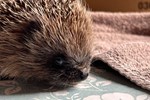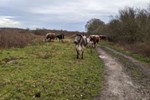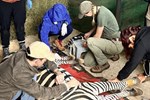RVC Wildlife Health - Projects
Investigating facial and limb abnormalities in European Hedgehogs (Erinaceus europaeus)
This project aims to describe the features and investigate the cause of a rare syndrome causing facial and limb abnormalities in European Hedgehogs (Erinaceus europaeus) across the UK and EU.
Health of domesticated cattle in rewilding
Domesticated cattle are used in rewilding projects to utilise their ecological impacts upon these systems. Human expectations, and therefore health measures, of these animals differ from those of farmed livestock.
Saiga Mass Mortality: ongoing research on causes of mortality in saiga antelope in Kazakhstan and Mongolia
The saiga project is a long-term contribution from RVC to research into understanding of the causes of mortality of the saiga antelope. This species ranges in the Steppes of Asia, in a few localities but is classified as critically endangered by the International Union for Conservation of Nature red listing process. The study findings to date provided unique information on the cause of mass mortality of saiga and the impact of PPR on saiga antelope.
Epidemiology of Tuberculosis in Meerkats of the Kalahari
Research project by the Royal Veterinary College investigating the epidemiology of Tuberculosis in meerkats in the Kalahari Desert in southern Africa.
Meerkats (Suricata suricatta) are social mammals that live in groups. A potential disadvantage of being social is that infectious diseases are more likely to spread. Tuberculosis (TB: a bacterial infection) was first detected in wild meerkats in southern Africa in the late 1990s.
Physiology and pharmacology of wildlife capture drugs
Wildlife species often require anaesthesia for veterinary care or relocation, but this process can be risky, especially for species like zebras, rhinos, and crocodilians. To improve safety and animal welfare, our research investigates the effects of capture drugs and tests safer anaesthetic combinations to support better outcomes in conservation and veterinary practice.
Recombinant Expression and Characterisation of Mycobacterium tuberculosis Complex Antigens for Diagnostic Development in Wildlife
This project develops recombinant MTBC antigens for dual-purpose serological and cell-mediated immune testing in wildlife. These tools enable non-lethal tuberculosis surveillance, supporting conservation, safe translocations, and disease management at the wildlife-livestock interface.
Immunogenetics Across Various Species
This project characterises immune gene diversity and leukocyte markers in African wildlife using next-generation sequencing. The findings will enable the development of cross-reactive reagents and immunological tools for disease surveillance, vaccine evaluation, and conservation health monitoring.
Elucidating the Role of Wildlife in the Transmission of Coxiella burnetii (Q Fever)
This project investigates the role of wildlife in the transmission of Q fever (Coxiella burnetii) in southern Africa, focusing on Etosha and Kruger National Parks. By analyzing archived samples from key species, it aims to provide the first cross-border surveillance data to inform One Health strategies and improve public health and veterinary policies.
Avian Origins and Mammalian Echoes: Serological Surveillance of Influenza A in African Wildlife
This project conducts cross-species serological surveillance of avian and mammalian wildlife within Kruger and Etosha National Parks to determine past exposure to influenza A viruses. Sampling targets species at ecological and trophic interfaces, such as waterfowl, scavenging carnivores, and grazing ungulates, to reveal interspecies exposure patterns and identify potential viral maintenance hosts.
Silent Shedders: Serological Surveillance and Diagnostic Tool Evaluation for EEHV in African Elephants
This project applies validated and adapted serological assays to screen wild African elephants for antibodies to EEHV. It investigates the potential for asymptomatic shedding and evaluates diagnostic tool performance under field conditions, providing insights into the silent circulation of the virus.







.JPG?v=638969259325144440)


.jpg?v=638969136813098038)